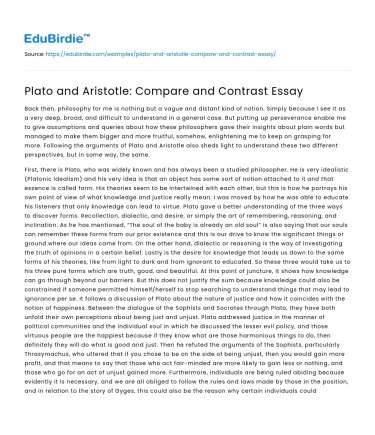Back then, philosophy for me is nothing but a vague and distant kind of notion. Simply because I see it as a very deep, broad, and difficult to understand in a general case. But putting up perseverance enable me to give assumptions and queries about how these philosophers gave their insights about plain words but managed to make them bigger and more fruitful, somehow, enlightening me to keep on grasping for more. Following the arguments of Plato and Aristotle also sheds light to understand these two different perspectives, but in some way, the same.
First, there is Plato, who was widely known and has always been a studied philosopher. He is very idealistic (Platonic Idealism) and his very idea is that an object has some sort of notion attached to it and that essence is called form. His theories seem to be intertwined with each other, but this is how he portrays his own point of view of what knowledge and justice really mean. I was moved by how he was able to educate his listeners that only knowledge can lead to virtue. Plato gave a better understanding of the three ways to discover forms. Recollection, dialectic, and desire, or simply the art of remembering, reasoning, and inclination. As he has mentioned, “The soul of the baby is already an old soul” is also saying that our souls can remember these forms from our prior existence and this is our drive to know the significant things or ground where our ideas came from. On the other hand, dialectic or reasoning is the way of investigating the truth of opinions in a certain belief. Lastly is the desire for knowledge that leads us down to the same forms of his theories, like from light to dark and from ignorant to educated. So these three would take us to his three pure forms which are truth, good, and beautiful. At this point of juncture, it shows how knowledge can go through beyond our barriers. But this does not justify the sum because knowledge could also be constrained if someone permitted himself/herself to stop searching to understand things that may lead to ignorance per se. It follows a discussion of Plato about the nature of justice and how it coincides with the notion of happiness. Between the dialogue of the Sophists and Socrates through Plato, they have both unfold their own perceptions about being just and unjust. Plato addressed justice in the manner of political communities and the individual soul in which he discussed the lesser evil policy, and those virtuous people are the happiest because if they know what are those harmonious things to do, then definitely they will do what is good and just. Then he refuted the arguments of the Sophists, particularly Thrasymachus, who uttered that if you chose to be on the side of being unjust, then you would gain more profit, and that means to say that those who act fair-minded are more likely to gain less or nothing, and those who go for an act of unjust gained more. Furthermore, individuals are being ruled abiding because evidently it is necessary, and we are all obliged to follow the rules and laws made by those in the position, and in relation to the story of Gyges, this could also be the reason why certain individuals could act unjustly.
Save your time!
We can take care of your essay
- Proper editing and formatting
- Free revision, title page, and bibliography
- Flexible prices and money-back guarantee
Diversely, Aristotle, one of the bright students and a disciple of Plato, is more logical and highly realistic. He was really good at common sense though because, unlike Plato, Aristotle is realistic. The manner of potentiality and actuality goes like how a certain thing could be and what actually manifests through it to achieve the telos or end goal, and that is to create something to understand the motion. It might be harder for me to comprehend Aristotle’s idea since it is boundless. He agreed with the Platonic view that an object has form and that form is eternal but rejected Plato’s claim that forms are independent of objects. There comes his point of view that there is “no form without matter, no matter without form”. This could be discerned that Aristotle compromises but stays in the middle. He taught us that a life of a man has its own purpose, and to attain that purpose is the function of one’s life. In simple terms, happiness and prosperity could be accomplished by living a life virtuously so that one can attain the very meaning of the 'good life'.
The world of Western civilization is immensely influenced by these two great minds who complement each other's perspectives. To sum it up, Plato studies the other world and stand as a guiding spirit of idealism in which he maintained the interest of discovering absolute and unchanging truth. Contrarily, Aristotle studies the real world through facts and common sense in which there is a desired categorization or bring order to declare certainties and the importance of studying science wherein we can all learn from.






 Stuck on your essay?
Stuck on your essay?

